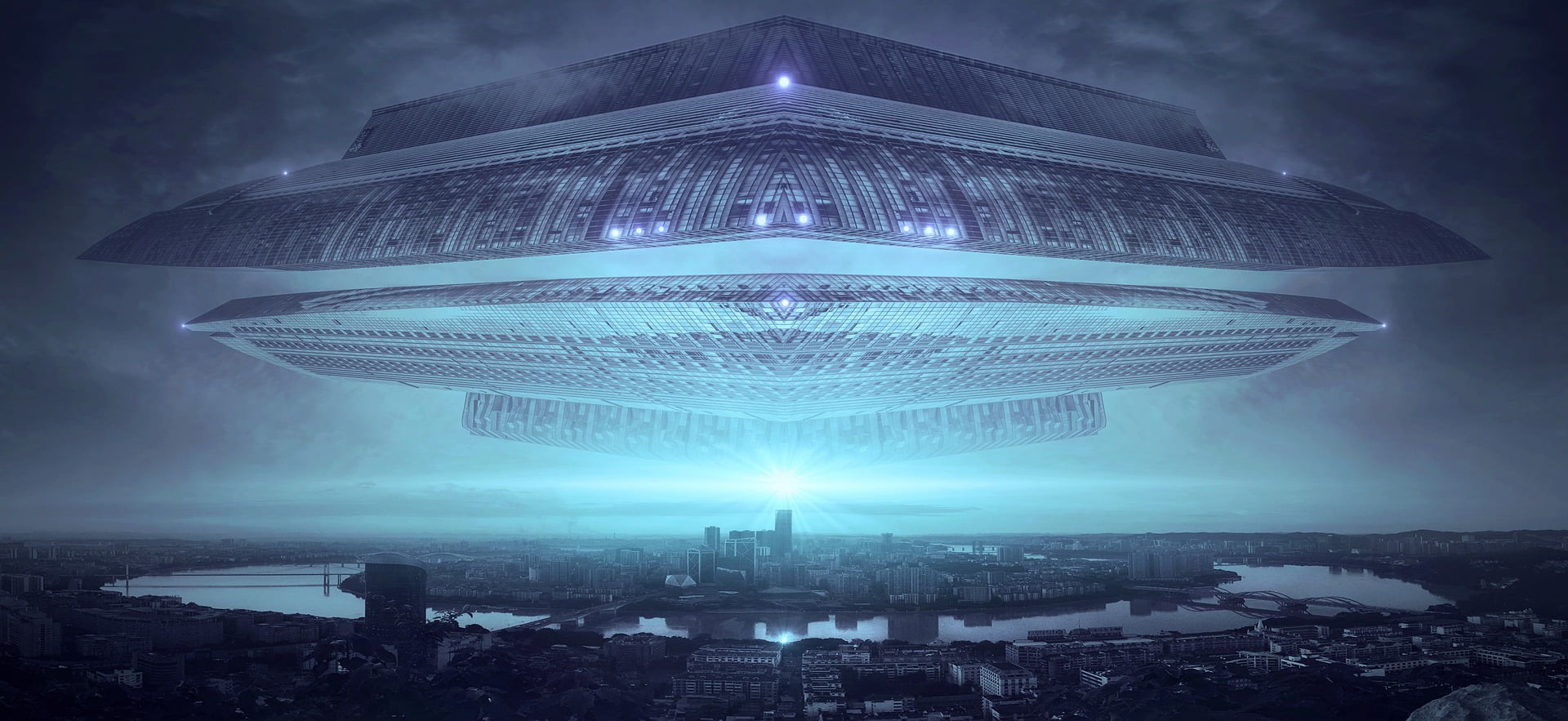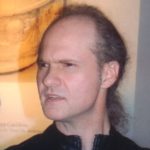No one knew why they came, and in the end, it didn’t matter. They came, and that bald fact alone was all the human race needed to know.
We could deduce certain things about them. They were bold, they were advanced and they were not given to subtlety. They had a single, obvious message for us, and they hit us over the head with it. They must have been monitoring us for many years because when the day came all they had to do was show themselves and leave everything else up to us.
I was driving an aircab on the run between Coogee and Circular Quay when they arrived. They were a bit hard to miss. First the city air traffic net lit up like Christmas, then people started screaming, and everything in the air was ordered down. I saw Police aircars with their spinners flickering herding drivers out of the air, and I put my cab down on the skypad of the Zhen Yun Hotel tower, overlooking Sydney harbour, half a kay back from The Rocks, by the bridge, and copped one of the best views imaginable. Or worst, if you felt that way.

My fare was a young lass on her way to an event at the Opera House and she was as dumb-struck as me, we sat under the long clear canopy of my cab and stared at the sky, gaping like goldfish, as the alien vessel made its appearance. It seemed to fill the sky from horizon to horizon, the clouds swirling and parting before it, sharp cracks of lightning around it as its motion created vast static potential. It was intricately detailed with mechanisms unguessable, its design seemed to follow no logic the human mind could comprehend, at least as abstract or aesthetic as functional; and it was black as hell, or just blocked out the daylight of a cloudy afternoon and hung over us like the stroke of doom.
My fare climbed over from the back into the seat beside me for a better view and at last offered her hand without taking her eyes from the thing. “Jody,” she whispered.
“Craig,” I returned, as softly. People sat in their craft all around us, the pad was now packed and others were turned away, sent racing for other landfalls or just out of the city as fast as they could move. From the corner of my eye I saw Jody take out her mobile and start imaging the alien, and realized people had their phones raised to the sky in most vehicles around us.
We waited for the streams of light to fall, for the fires and chaos, the devastation – it was obvious we were helpless before them. For a good twenty minutes we expected to die. I saw a guy in the next car praying, a rosary at his lips, and knew others throughout the city would be doing the same – prayer mats and shawls, sidewalk services, Muslims facing Mecca. But after half an hour we were getting bored, and many began to leave their vehicles, walk to the safety rails at the edge of the roof for a better view, and chat.
What can I say? The alien ship must have been over a dozen kilometres long, it was up there, and it didn’t do a damned thing. Not an overt act, not a blinking light pattern, nor a voice of thunder from the heavens. It just hung there, as if it was saying you think you’re so smart? What do you make of this? Take your time, kiddies, you’ve got plenty of it.
And that was probably the point, the whole point and nothing but the point. Because in the moment of paradigm shift, the human species seemed to lose its grip on reality. Oh, the better minds among us inferred a lot – these aliens did not give a rat’s ass for human notions of pecking order, they revealed themselves in Australia, not America. Nor over London, nor Moscow, nor Tokyo. They were in no rush, and were, undoubtedly, watching us cockroaches running frantically in the maze when provided the stimulus.
Well, we sure put on a show. Besides the praying, there were those running in terror, those demanding the aliens be attacked, those trying to communicate – with everything from radio waves to human bodies spelling out welcome on Bondi Beach, and other such banalities as an hour became two. And plenty of folks who assumed it was judgement day and waited to be raptured. Many more lost their grip on sanity, on life itself, and rained from high places, to the disgust of those who were barbecuing in the parks – Centennial, Queen’s, Hyde, Nielsen, it was over them all – and lay back on beach towels to stare up at the vessel and wait, because the ball was clearly in our visitors’ court.
That was the worst part, I thought, as I leaned on the railing with Jody, and we got stiff necks from staring at the city-sized thing, growing cold in its night-dark shade, watching Police aircars cruise cautiously around it. It did nothing. It made no move, replied to no entreaty, just showed itself like a grotesque photo-op and people took freakin’ selfies with it in the background. According to Facebook stats, over 400, 000 such images went up in less than two hours. Was that the defining moment in first contact? That the reality of technological alien visitation was absorbed into the human experience as a manifestation of the selfie disease?
If so, it boded ill for the future, because about then the ship moved. It turned very gently, lightning following it through the clouds and striking to the ocean beyond Sydney Heads, and, little by little, it faded from our sight. One moment it filled the sky, the next it was receding, all in ghost-like silence but for the rumble of the storm following it, leaving millions of people with a sudden, aching hole in their hearts and lives. The population of a city stood and stared, and reached after it with supplicating hands, crying out for … something. Anything. Anything but the blank wall they left us.
Were we afraid? Were we too eager? Were we aggressive, or overflowing with tribal superstition? All the above, and maybe it was one big lesson – because Revelations is now a whole new book, and what we make of it will more than likely govern their attitude to us, next time.
‘Caus, there’ll be a next time. They’ve opened the door, just a crack; and we’re waiting with very mixed feelings for the day they choose to step through it.
This story previously appeared in Daily Science Fiction, 2018.
Edited by Marie Ginga
Mike Adamson holds a doctoral degree from Flinders University of South Australia. After early aspirations in art and writing, Adamson returned to study and secured qualifications in marine biology and archaeology. He has been a university educator since 2006, is a passionate photographer, master-level hobbyist and journalist for international magazines. For more about him, check out his website, The View From The Keyboard.

